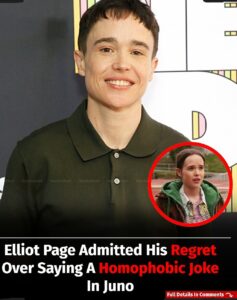Elliot Page Reflects on Regrettable Joke in Juno: “I Didn’t Fully Grasp It Back Then”

While Juno remains a beloved coming-of-age classic, Elliot Page has opened up about one particular line in the film that he now wishes had never been included.
Released in 2007, Juno—directed by Jason Reitman and penned by Diablo Cody—follows the story of a witty and unconventional teenager who faces an unplanned pregnancy. Page starred as the title character alongside Michael Cera, who played Paulie, Juno’s close friend and the baby’s father.

Initially considering abortion, Juno is dissuaded after encountering anti-abortion protesters outside the clinic. She decides instead to carry the pregnancy to term and arrange for the baby to be adopted. That leads her to Vanessa and Mark Loring, a couple played by Jennifer Garner and Jason Bateman.
Juno quickly notices that while Vanessa is highly committed to becoming a parent, Mark seems more passive about the idea. As their conversations deepen, Juno and Mark form a connection through shared interests, especially music.
However, one of their lighter exchanges includes a line that Page has since looked back on with regret.
The Line That Didn’t Sit Right
In a scene where Juno and Mark are lounging together, he tells her that he and Vanessa have started brainstorming names for the baby. When Mark mentions that Vanessa likes the name “Madison,” Juno responds:
“Madison? Wait, hold on…Isn’t that like a little, gay?”
At the time, the comment seemed like a throwaway joke in a teen comedy. But over the years, it has drawn criticism for being dismissive and homophobic—a sentiment Page now fully agrees with.
Page’s Reflection on the Scene
In a 2017 interview with Bustle, Elliot Page spoke candidly about how his perception of the joke has changed over time.
“I didn’t really register it in the moment,” he admitted. “But now that I’ve grown and learned more, I absolutely see how wrong it was.”
Page emphasized that this sort of language wasn’t unique to Juno and was, in fact, commonplace in many films he loved growing up. “There’s so much homophobia, transphobia, and biphobia baked into old movies. I’m not making excuses, just acknowledging that reality.”
As someone who now advocates for more authentic LGBTQ+ representation in film, Page shared that he intentionally skipped the line during a Juno table read for Planned Parenthood, showing his discomfort with repeating it.
In his memoir Pageboy, published after his public coming out as a transgender man, Page also explored the emotional complexity of becoming famous for playing a teenage girl—a role that further distanced him from his true identity. The experience left him feeling disconnected from himself, even as his performance earned critical acclaim.
Despite these personal challenges and the evolving cultural lens through which Juno is viewed, the film remains a significant milestone in Page’s career, earning four Academy Award nominations—including one for his performance—and sparking broader conversations about adolescence, choice, and now, the importance of inclusive storytelling.